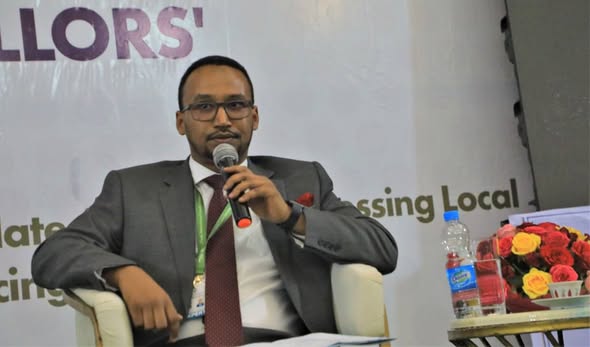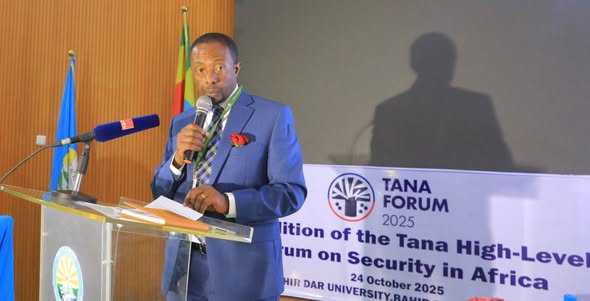
University leaders convene at Bahir Dar University
25 Oct, 2025
University Leaders Convene at Bahir Dar University to Reimagine Africa’s Role in a Changing World
University leaders convened at Bahir Dar University to reimagine Africa’s role in a changing world under the theme “Universities’ Dual Mandate in Africa: Harnessing Local Knowledge and Advancing Global Solutions,” at the opening event of the Tana Forum 2025.
The forum commenced with an opening introduction by the event’s Master of Ceremony, Dr. Manendante Mulugeta, Director of External Relations and Partnerships at Bahir Dar University, followed by Dr. Mengesha Ayene, President of BDU, whose welcoming remarks set the tone of the forum.
The keynote speaker of the 2025 Tana Forum was Mr. Manssour Bin Mussallam, Secretary-General of the Organisation of Southern Cooperation (OSC). Mr. Manssour previously founded and led the Education Relief Foundation (ERF) in Geneva from 2016 to 2020, an organization dedicated to promoting Balanced and Inclusive Education (BIE).
In his pre-recorded keynote address, titled “The Third Way of Development: Building Knowledge-Powered Societies,” Mr. Manssour emphasized the transformative potential of knowledge in driving Africa’s development. His remarks focused on reconceptualizing the source, power, and dissemination of knowledge to foster self-determined growth across the continent.
Introducing the concept of a “Third Way of Development”—conceived in the South, driven by the South, and beneficial to all humanity—Mr. Manssour underscored the need to address persistent inequalities in knowledge production and dissemination. This approach, he noted, would enable the Global South to define its own developmental trajectory.
Further expanding on this vision, Mr. Manssour advocated for the establishment of regional transdisciplinary research centers to identify, frame, and solve local challenges through innovative, research-based approaches. He stressed that the products of knowledge are common public goods, to be shared collectively in the service of human dignity.
In conclusion, Mr. Manssour proposed the creation of South–South mobility frameworks, including the potential introduction of a “Southern Research Visa.” He urged the forum to transform these ideas into concrete commitments that would shape a future built by and for the South—for the benefit of all.
Panel Discussion
Following the thought-provoking keynote address, the forum hosted a stimulating panel discussion skillfully moderated by Dr. Samuel Kifle, President of Addis Ababa University. The panel brought together three distinguished university leaders:
- Dr. Mengesha Ayene, President of Bahir Dar University (Ethiopia)
- Dr. Mohamed Ahmed Sulub, President of University of Hargeisa (Somaliland)
- Prof. Abderrhman Ahmed Mohammed Ismeil, Vice-Chancellor of University of Sinnar (Sudan)
Dr. Samuel guided the discussion around three fundamental questions:
- What roles should African universities play in national development in today’s rapidly changing world?
- How can the decolonization of education be advanced across Africa?
- What strategies can be adopted to integrate African universities for impactful knowledge development?
The panelists engaged deeply with these questions, examining the philosophical foundations of education and knowledge, the role of research and knowledge transfer, and the importance of international collaboration. They emphasized the need to utilize local knowledge while ensuring its global relevance, and to standardize education to foster collaborative engagements among African research and academic institutions.
The discussion highlighted several strategic priorities, including technology transfer, knowledge incubation, student exchanges, and joint research initiatives as essential pathways for Africa’s sustainable development. While emphasizing local relevance, it was agreed that African education systems must also strive for global competitiveness.
Moving away from the traditional “ivory tower” model of education, the discussion called for a more contextually grounded approach—one that reflects local social, cultural, and environmental realities. It was emphasized that decolonizing education must begin with re-examining epistemological foundations and empowering local communities as co-creators and leaders of knowledge and innovation.
The panelists further argued that Africa must establish its own academic and research standards to effectively decolonize curricula and scholarship. This can be achieved by integrating indigenous knowledge systems into educational frameworks—using local solutions to address local problems. A case in point discussed was Africa’s enduring indigenous conflict resolution mechanisms, which exemplify time-tested local wisdom.
At the same time, the speakers stressed that international academic and research partnerships remain vital for achieving global impact and visibility.
A key theme emerging from the panel was the urgent need for strong continental leadership, akin to other regional unions, that recognizes and invests in the power of knowledge and wisdom as cornerstones of Africa’s advancement. The participants emphasized the importance of redefining the essence, source, and application of knowledge, ensuring that African scholarship contributes meaningfully to the global knowledge framework.
Finally, the discussion underscored the necessity of standardizing and harmonizing higher education systems across Africa to facilitate student and faculty mobility and enhance collaborative research among universities on the continent.
The event brought together university leaders, education stakeholders, invited guests, faculty members, students, and other participants.


